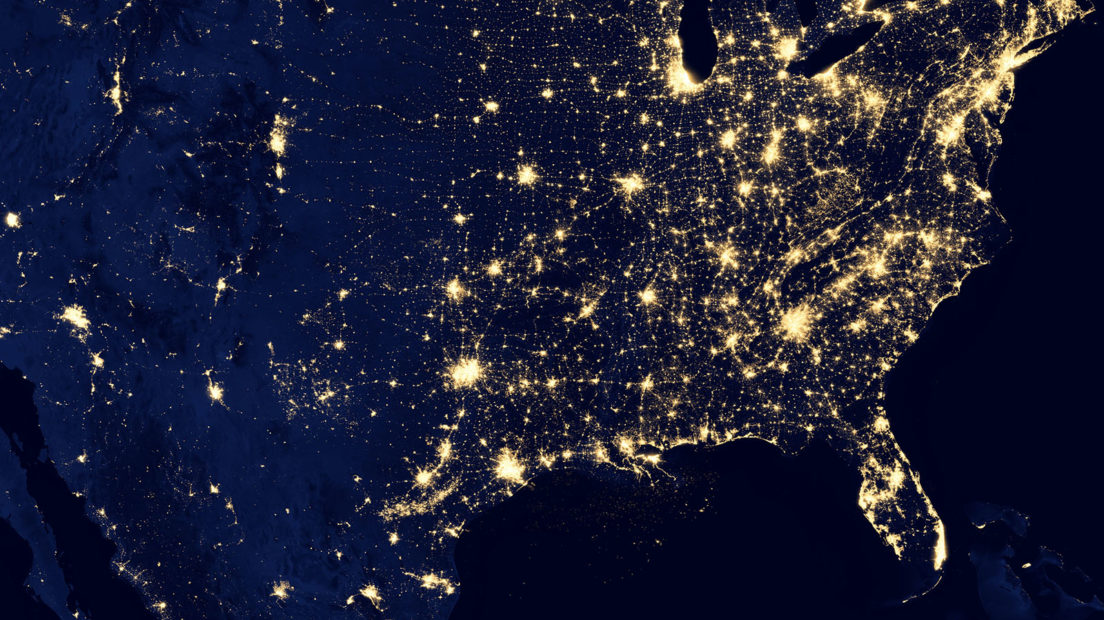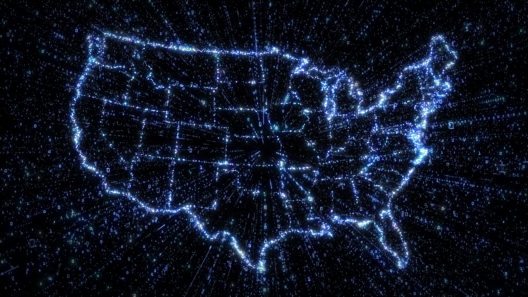Tipping towards trans-nationalism – data, tech and the future of nation states
How data, tech and geopolitics might shape the future
11 December 2020
Reading time: 9 minutes

When President-Elect Joe Biden is sworn into office in January 2021, he will face a world in a state of uncertainty, plagued by a deep lack of trust. For both the good of the United States and societies around the world, it will be his duty to ensure the United States emerges from the challenges of the COVID-19 pandemic, the deep economic recession and its polarised society, renewed, revitalised and rebuilt.
Leveraging new technologies will be an integral part of that , especially among open societies where, as Karl Popper noted, individuals are confronted with personal decisions of choice – and political freedoms and human rights serve as foundations. The same technologies have collectively challenged a notion of nation states that dominated the twentieth century, by spawning transnational technology corporations that link human social movements in ways that surpass geographical boundaries.
New technologies and the data that drives them are changing societies around the world. Companies and individuals have gained access to both technological and advanced data capabilities that previously were only available to the national security apparatuses of large nation states thirty to forty years ago. This access is super-empowering private sector entities and some individuals with unprecedented reach and ability.
The number of people on Earth has changed – up from 2.5 billion people on the planet in the 1950s, to 7.8 billion in 2020. The number of networked devices on Earth has changed dramatically, with an estimated 50 billion networked devices on the planet by 2021 – up from 5 billion in 2003 and only 25 billion in 2015. The amount of data on the planet is estimated to be 44 billion terabytes in 2020.
Even before COVID-19, the primary challenge to the ‘Westphalian’ notion of nation states with complete sovereignty over citizens within their borders was the internet and increasing transnational digitalisation. The Westphalian ideal is the pattern of nation states, with a rule of law defined by geographical borders, that emerged out of the Thirty Years’ War in seventeenth-century Europe and replaced a patchwork quilt of overlapping medieval loyalties with more solid blocks of unitary rule under a sovereign.
Advances in tech and data have produced a world where traditional government activities no longer need to be performed by governments alone; where private-sector entities must think beyond just their own individual profits, to include community responsibilities and obligations; and where a public remains mistrustful of both the government and the private sector.
Policymakers must be able to adapt and demonstrate effective governance at a speed faster than any time before in the history of the world. We must do this in an era where the private sector and members of the public will increasingly need to use emerging technologies – such as artificial intelligence, commercial space satellites, next-generation biosensors, and more – and achieve outcomes heretofore provided solely by governments.
To complicate things further, some transnational entities now have outsized influence, especially when it comes to digital capabilities, datasets and influence. This represents a new era for doing both the business of civil societies as well as the global business of diplomacy. Such transnational private-sector entities need to recognise that functions that previously were done solely by government now require their partnership to successfully continue – such responsibilities cannot be ignored lest the functions of societies fall apart or attempts at regulation take the place of stewardship on both the national and global stage.
Transnational corporations now wield as much, if not more, power than nation states. As of mid-2019, the total market capitalisation of the five ‘FAANG’s (Facebook, Apple, Amazon, Netflix and Google) hovered near $3.2 trillion. At the time that was more than the total world economy of all but four countries: the United States, China, Japan and Germany. When transnational corporations are this large, it is not clear whether nation states or corporations have more geopolitical power.
For open societies like the UK, EU and the US questions include: how can each collaborate in finding ways for more participatory, inclusive approaches to data and technology to uplift their societies and economies. Doing this will require successful frameworks for data, sensemaking and trust.
Such a framework would help these open societies double down on their values, to include valuing human agency, human dignity, the freedom of speech, privacy and intellectually generated work. Such a framework must be easily understood, accessible and consumable by the public, to include understanding how data is assessed to create information, who to trust and how to trust is established, and how to evaluate sensemaking by others.
Furthermore, such a framework must take account of the features of any open society, where anyone can contribute to the dialogue, and where many seek to insert misinformation and disinformation, and to sow distrust, slow both action and reaction, and create an advantage for themselves. It must also seek to understand how misinformation and disinformation spreads whether wittingly or unwittingly, and help the public to understand how and why this happens, what it means to them, and how they can respond to support our national security and their own interests.
It is worth noting that authoritarian regimes may have some advantages in a rapidly changing world – including not having to coordinate across their public and private sectors nor work to build public consensus on their nation direction – open societies have other advantages tied to their valuing different perspectives and insights that have consequentially driven innovation. While an authoritarian government can command its military, people and economy, an open government can tap into the broader population and all sectors to leverage individual and collective strengths in support of its actions.
Before COVID-19, for transnational corporations providing digital services – aside from the challenges of a fragmented internet as highlighted earlier – global data governance was becoming increasingly fragmented. Global data governance is complicated by different governance standards, which can be contradictory, such as guidance from the GDPR and California Consumer Privacy Act. China’s proposed law last year requiring availability of all to the public, including data of foreign individuals and companies, would make this even more difficult. In some respects both data standards and governance standards are like toothbrushes: everyone claims to want one, just not to use someone else’s– in this case a proposed data or governance standard.
At the same time, increasing digitisation of physical manufacturing processes seems to be the future. Physical factories that require humans to be present to operate appear to be liability during a pandemic. Moreover, digital services seem well-positioned to thrive in either in pandemic or normal operation settings.
Now that the world has demonstrated how quickly it can pivot to a significant number of people working from home and receiving services delivered to their home, both private and public sector leaders presumably will be preferring increasingly digital goods and services. This includes automation and robots to produce physical goods as well. China recently claimed that 37 percent of its retail sector was digital compared to 11 percent of the United States.
While the stock prices of Facebook, Apple, Amazon, Netflix and Google have at times been adversely impacted during COVID-19, national economies around the world have suffered consistent contractions. The question for the months ahead is whether these companies, who are mostly digital and agile in their service offerings already, bounce back more robustly than individual national economies globally. Should this happen, will the transnational companies ‘help back up’ nations as well, or will a new geopolitical arrangement emerge where companies wield and shape economic power and influence?
These technological and economic trends linked to COVID-19 may be the collective straw that breaks the proverbial camel’s back when it comes to the post-World War II international order. Will nation states remain relevant in what comes next, or will the tension between globalism – that was present before COVID-19 – and the realpolitik that is COVID-19, result in something different than nation states?
One structural possibility is hyper-regionalism, defined by what technological, commercial and protective flow of humans, animals and plants arises. This could be embodied by mega-cities becoming dominate geopolitical actors, dramatically redesigned in the future to provide essential services in a more resilient fashion to future pandemics and other natural disasters, defined less by national identity and more by what they provide those individuals who live within the municipal areas.
Mega-cities of the future, empowered by technology to provide for those within the immediate vicinity and capable of responding at faster speeds than nations, could forge their own trade agreements, public health arrangements, and climate change accords with other cities globally, via direct diplomatic relations—or a devolution away from large nation-states to smaller regional powers defined by identity, as seen historically to a degree in the Balkans during the 1990s.
Another possibility is that transnational groups, organised either by ideology or corporate identity, replace the concept of Westphalian nation-states defined by geography. In a post-COVID world, as we move towards recovery there will be a need for individuals who travel to validate that they are not infectious nor pose a risk to others.
Technological solutions may arise tied to a person’s passport, or services may arise tied to a person’s place of employment, commercial laboratory testing service, or some other global mechanism – similar to how anyone can become an e-resident of Estonia without residing in or being a citizen of Estonia. The challenges of ensuring individuals are ‘safe to travel’ and goods are ‘safe to cross borders’ may strain the Westphalian nation-state model past its breaking point and replace it with something that is more network-centric in nature.
From a foreign policy perspective, in the midst of growing tensions, success for the United will depend on cooperation with allies and partners – to include both nation states and transnational private sector entities – on issues like artificial intelligence, the future of space and data trusts. This will include working with the largest global democracy India, as well as other nations around the world who are seeking a future where data and technology empower open societies.
To such an end, the United States must work to assemble a coalition of ‘digital democracies and more’, who seek not surveillance states, nor surveillance capitalism. Such a coalition would work across borders and sectors to build a world where we employ data and tech for greater digital empathy, diversity and shared humanity across nations and economic sectors.
In sum, the future for the decade ahead presents companies, countries, and communities with a plurality of different choices for where data and new technologies might take us. While the speed at which things are changing might prevent us from deliberating or considering all choices as the future unfolds, some forethought and intentionality in those choices might behoove us well if we want a future that is inclusive, uplifting, and one that encourages productive collaborations across sectors and borders that benefit us all.
This article is the first article in a series on the geopolitics of data regulation, exploring questions arising from the UK’s National Data Strategy, transition from the EU and new regulations, and the impact of the incoming Biden administration on Anglo-Euro-US cross-border data transfer.
Related content

America’s ‘privacy renaissance’: What to expect under a new presidency and Congress
A deep dive into US privacy legislation and implications for US-EU-UK relations

Ada’s National Data Strategy consultation response
A summary of the Ada Lovelace Institute's response to the National Data Strategy consultation

Data-driven responses to coronavirus are only as good as the trust we place in them
Data is bringing huge benefits in the fight against Covid-19, but we must remain vigilant about NHS plans to collaborate with tech giants.

Should more public trust in data-driven systems be the goal?
To better understand the limits of public trust in data-driven systems, we must acknowledge the role structural inequalities play in shaping trust